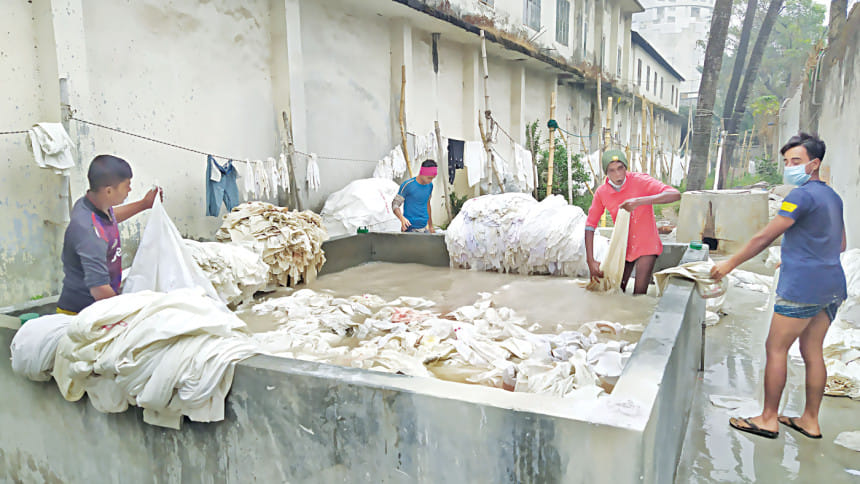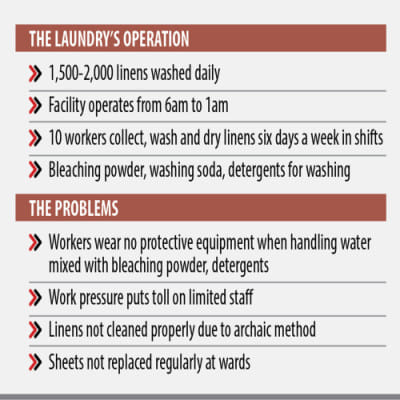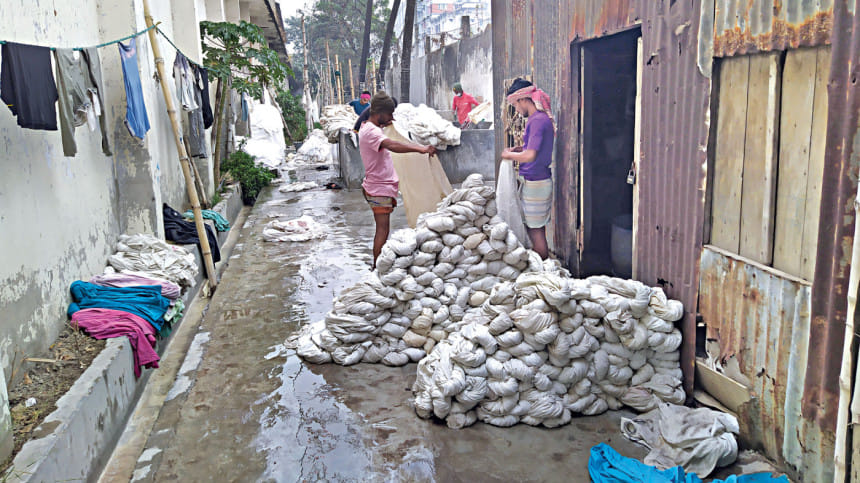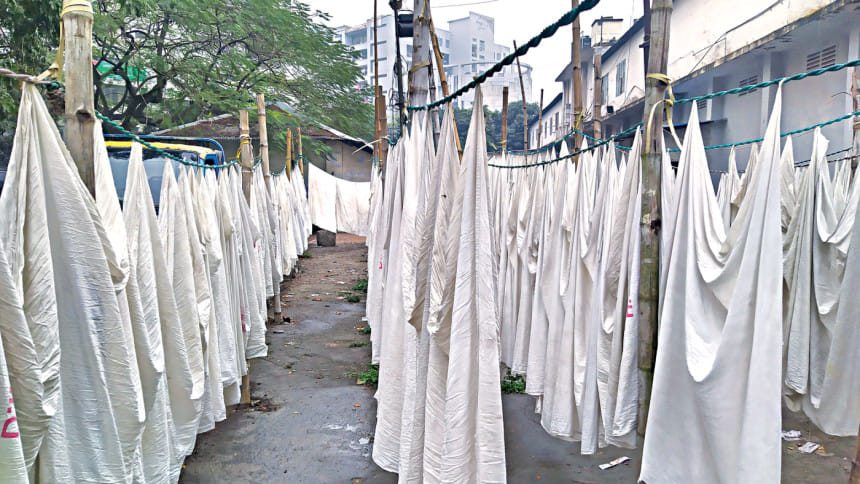DMCH’s ‘dirty’ laundry

People from across the country flock to Dhaka Medical College Hospital (DMCH) for treatment. According to hospital authorities, around 4,000 patients remain admitted to this 2,600-bed public hospital on a regular basis.
And every day, around 1,500-2,000 hospital linens such as bedsheets, aprons of doctors and nurses and operation sheets are being gathered from wards and operation theatres, washed and dried round the clock to meet the demand.
But for a hospital of this size and proportion, its washing service still remains archaic, failing to meet the strict hygiene requirements of healthcare facilities.
The washing facility, located adjacent to the nuclear medicine building and Dhaka Medical College morgue, was set up in the mid-1940s, right about the time when the hospital was established.

Over time, the hospital went through many changes, improved and upgraded its services. However, the procedures at the laundry did not see any improvement and still rely on human labour, which is also not up to the mark due to manpower shortage.
This laundry stays open from 6 in the morning till 1 at night. There are 10 workers who collect, wash and dry linens there.
And of course, this method of using human labour, that too with only 10 persons, to cover such an extensive amount of work results in constant complaints from patients and hospital staffers about the quality of the work, and above, all raises questions about hygiene.
There are also complaints that the linen sheets often have spots and gets torn.

THE WASHING PROCESS
The workers have it hard too. They work six days a week in shifts and on a temporary basis through a contractor, making around Tk 10,000 to Tk 12,000 per month.
Saddam is one such worker. The youth started working last year.
"I was looking for a job amid the pandemic to support my family," the Mymensingh resident told The Daily Star in March. "One of my acquaintances referred me to the contractor, and that's how I started working here."
He said all the workers live nearby as they have to start working early in the morning.
Five of them start at 6am. They go to different wards, OTs and collect used linen sheets and put them in sacks.
"Then we use trolleys to carry them to the laundry place. Sometimes, we have to carry those sacks on our head, as we cannot bring the trolley everywhere," he added. "By the time we are done with that, it's almost 10:30am."
During multiple visits over the month, these correspondents saw that most of the sheets collected from the OT were blood-stained.
Also, there's no markings to specify which pieces of cloth are from which department or ward. All the things collected from wards get mixed up during washing and are taken back randomly.
When asked if they use any gloves or masks, Saddam replied in the negative. Once the pieces of cloth are taken to the laundry, they are boiled in huge bowls filled with detergent and water.
The workers said they use bleaching powder, washing soda and detergents for washing.
From there, they bring those to the washing place, where at least five persons wash them in water mixed with detergents in large tanks.
Once washed, the linens are dried on wires or ropes besides boundary walls or anywhere they can find open space inside the hospital premises.
After that, they are brought back to the laundry. One group then folds them and another takes those back to hospital wards.
Saddam said he mostly collects and dries the sheets. "It's hard work, but I don't want to leave it, as jobs are scarce at this moment," he said.

HEALTH RISKS, MANPOWER CRISIS
However, those who are involved with washing have to handle water mixed with bleaching powder and detergents for hours, which also takes its toll on them.
While talking to the workers, many said they often get sick
working in such a condition. Due to the hard work, the workforce changes constantly.
Salman Molla, who claimed to be an honours student at a college in Gopalganj, said he started the job last year to support his family.
Asked about lack of cleanliness and sheets getting torn, the 21-year-old said it's due to manpower shortage as they are under huge workload.
Abul Hossain (42), who has been working there for seven years, echoed him.
"Five of us wash the linens and others help us fold and carry those… We try our best but there are not enough of us to handle the workload," said the Nimtoli resident.
NOT PROPERLY WASHED
Meanwhile, many of the hospital staffers complained that this method of washing and cleaning is old and the linens are not being cleaned properly.
They demanded that the system be upgraded.
"At times, blood stains and other spots remain on the sheets, and we have to send those back for cleaning. They also get torn in places," said a nurse supervisor, seeking anonymity.
"Many times, attendants or patients also ask us to change the bedsheets," she added.
Another senior nurse said they mostly have to bear the brunt of the situation, as patients and attendants often blame them.
"If we had a washing plant, then this problem would not have persisted. We are upgrading and improving our service at the hospital constantly when it comes to treating patients… but what about the linens? They are also an integral part of the process," she pointed out.
Talking to The Daily Star, Hanif Mia, a patient at the neurosurgery ward, said, "I have been admitted here for last two weeks. Even after the bedsheet gets dirty, it gets changed after two-three days. Often, they are not cleaned properly. I raised the issue but to no avail."
Some patients at the cabin block of the hospital's old building echoed him. They, however, said they do get new bedsheets regularly but often times they are not cleaned properly.
Despite repeated attempts, this newspaper could not get in touch with the contractor who is in-charge of the manpower at the laundry.
However, this newspaper met with the contractor's representative, Mohammad Jewel, recently, who introduced himself as his assistant.
That day, workers were washing around 1,920 hospital linens.
He admitted that they have a manpower crisis. "Before we had 15 workers but some left. Eleven of us, including me, are working here. We try our best... If we see any spot or find linens dirty we clean those right away," he added.
"We are also trying to increase manpower," he said.
WASHING PLANT FOR CORONA WARD
It's not that DMCH does not have any modern facility for washing.
Linens from the coronavirus ward at the hospital are sent to a washing plant situated next to the old laundry place.
It's a small operation, but effective nonetheless.
They used to wash around 300 linens a day, said Chayan Das, supervisor of the (Covid-19) washing plant. "Now, we wash around 200 linens per day," he said.
Chayan said four persons -- two temporary and two hospital staffers -- work at the plant. He said they have set up the plant around two years ago.
They used to have a similar one in Tejgaon, he added.
WHAT OFFICIALS SAY
Regarding health risks of workers and those who are using the linens, Prof Dr Sultana Shahana Banu, head of the virology department at Dhaka Medical College, said the workers must follow health guidelines while collecting, washing and distributing the linens.
"If they do not follow the procedures, there are of course health risks involved here," she added.
Contacted, DMCH Director Brig Gen Nazmul Haque said they have outsourced the washing process and are not directly involved with it.
He, however, said he did not hear any major complaints in this regard.
"We are trying to improve the service. For example, we do not wash linens from corona ward this way. We use separate washing machines for those," he said.
"We are planning to upgrade the overall system soon," he added.


 For all latest news, follow The Daily Star's Google News channel.
For all latest news, follow The Daily Star's Google News channel. 



Comments